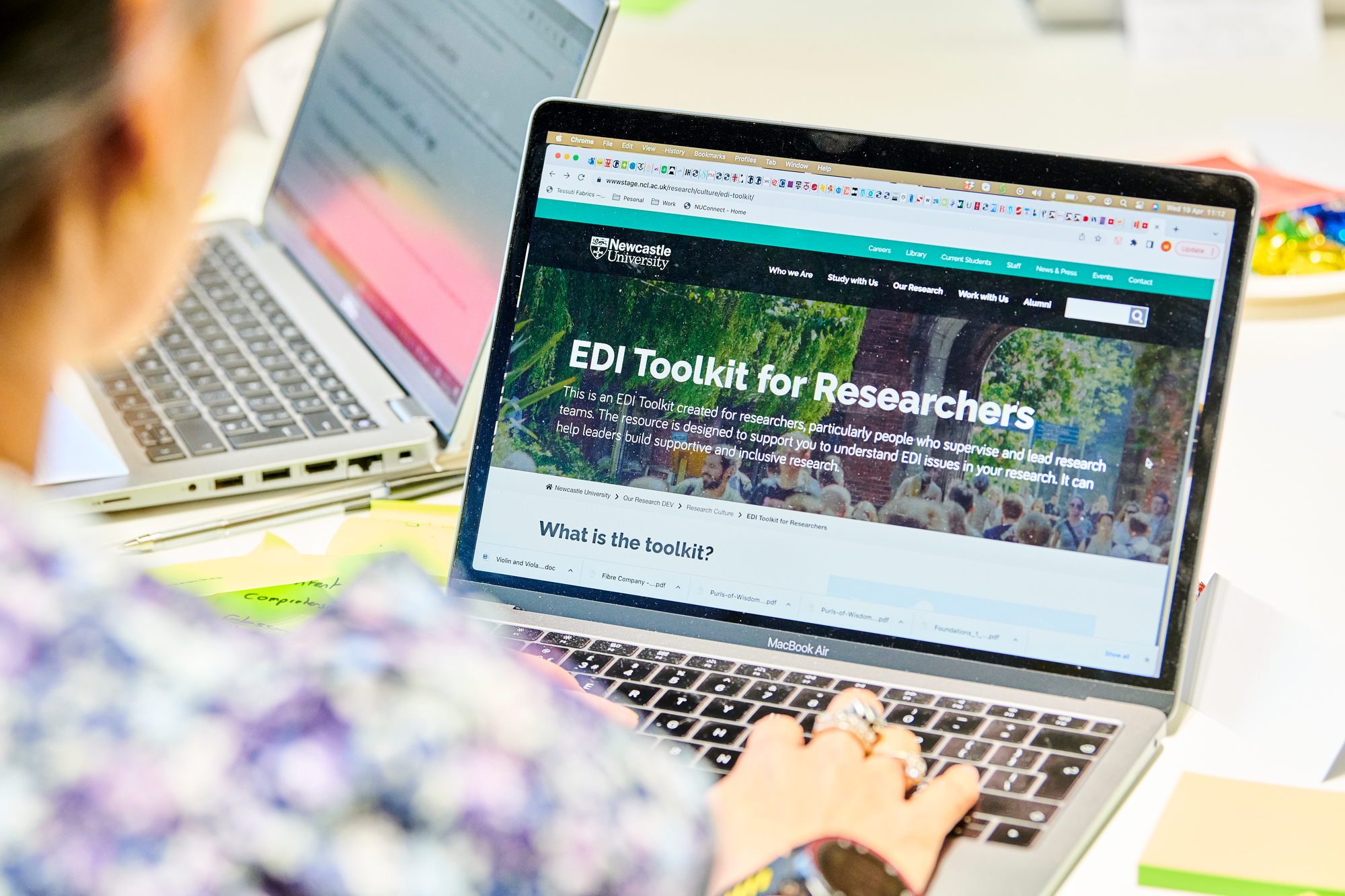How the toolkit can support you and your research
Engaging with the toolkit can support you, your research activity, and the people you supervise and manage in a variety of ways. Find out the different ways you can benefit from the toolkit.
Increasing awareness of Equality, Diversity and Inclusion (EDI)
This toolkit contains information on the nine protected characteristics and has been designed to increase your awareness and understanding of these characteristics, the discrimination that can occur, and what we can do to be an ally. You can find out about the experiences that people with specific characteristics can face in academia and research to help you step into the shoes of people who are different from you. If you are from Newcastle University, you can also use the toolkit to find out about training opportunities, events, networks, and other initiatives available to promote EDI and get involved.
Engaging with EDI is a responsibility that lies with us all. Academic societies, charities, and funders are showing their engagement with EDI, including UK Research and Innovation, Royal Society of Chemistry, Royal Academy of Engineering, Wellcome, and the British Academy.
Writing research funding bids and proposals
EDI is important to funders. They are increasingly asking researchers for EDI statements as part of their grant applications and asking about EDI and Research Culture at interview. This toolkit can help you grow more confidence to identify and discuss EDI issues during the application process. Being aware of a range of EDI issues will allow you to take the next steps to create a positive research environment through inclusive behaviours, activities and leadership.
Supporting colleagues to better understand their funding bids
Wellcome have created a library of resources to address inequities in funding. The Equitable Funding Practice Library brings together ideas that can be used to solve common challenges in reducing and eliminating inequity in funded research programmes. This resource can be used as a funder, grantee, applicant, advocate, or anyone else working to make funding outcomes more equitable.
Funders have different approaches and requirements. For instance, the National Institute for Health and Care Research (NIHR) has its own toolkit developed to support researchers to better understand how to embed EDI in research design and to meet the NIHR’s EDI requirements. UKRI also has an EDI toolkit called ‘expectations for equality, diversity and inclusion’. As well as addressing existing inequalities, these can help you broaden the reach and impact from your research.
For Newcastle colleagues
Researchers at Newcastle can engage with the toolkit to understand good practice at the University. You can work through the toolkit to find examples, which you could include in your proposals, of the internal networks set up at Newcastle and the external organisations we are linked with.
The Research Funding Development (RFD) team provides strategic pre-award research funding services which includes guides to EDI in research proposals, as well as examples of EDI statements. Newcastle University colleagues will have access to these resources on the Research Funding Development resource library. The RFD team acknowledges that funders have different approaches and requirements. They address this in the resources available by providing examples for various funders – for instance, the National Institute for Health and Care Research (NIHR) has its own toolkit developed to support researchers to better understand how to embed EDI in research design and to meet the NIHR’s EDI requirements. UKRI also has an EDI toolkit called ‘expectations for equality, diversity and inclusion’.
Completing high quality research with maximum impact
The toolkit can also help support research activities. When working with people in your research environment or community, you should ensure that you are treating everyone fairly. By working through the protected characteristics and understanding the difficulties that minoritized groups can face, you can be more inclusive in your activities. Understanding and appreciating the value of diversity within your teams and in your research practices, can in turn have a positive impact on the quality of research that’s produced.
EDI is an important consideration in the research itself. For example, you should think about how your research outputs can help diverse groups in its impact and ensure that we work responsibly with researchers from around the world.
This toolkit can be used to supplement the content and guidelines produced by individual funding bodies, to help you think about how you can practice and benefit from considering EDI in your work and research.
Hosting conferences and visiting speaker events
When organising a research-related conference or arranging for a visiting speaker event, you should think about whether the arrangements are EDI friendly, asking questions such as:
- Are the panellists, invited speakers or chairs representative, in terms of diversity?
- What are the start and end times? Will colleagues be able to attend?
- Are you using inclusive language? Are you aware of inclusive terminology?
- If in person, is the building accessible? Does the room support any additional access needs?
- If online, do any attendees need closed captions enabled?
You can refer to our Accessibility Guide to help ensure that any content shared with guests and speakers is accessible. You can also use this to think about the access requirements individuals may have to attend an in person or virtual event.
Recruiting talent with inclusive and diverse practices
You may approach the toolkit as part of a recruitment process for new researchers or students. For example, you might want to create job adverts that attract diverse applicants, or create application assessments as part of interview processes. You can look at the sections on the nine protected characteristics and how to beome more aware of any unconscious bias that you may have.
You can refer to our Using Inclusive Language Guide to ensure you use inclusive language when talking about race, gender, sexual orientation and gender reassignment in adverts and job descriptions.
Using inclusive and diverse recruitment practices will allow you to confidently recruit individuals to your group or team, both colleagues and students. Understanding the benefits of equality, diversity and inclusion, but also becoming aware of any biases (such as unconscious bias) will inform your choices throughout the recruitment process to recruit the best talent.
Supporting team members and their development
As a leader in research, you may wish to engage with the toolkit to support you and your conversations with your team members. As a manager you can work through the sections on protected characteristics to ensure you know how to support your colleagues should they raise any concerns. This would allow you to better support researchers in your teams and hold a greater understanding of the challenges they may face, as well as holding an awareness of the support networks that are available. Successfully managing diversity can lead to more committed, better satisfied and better performing colleagues in the workplace.
You could use the toolkit to strengthen your awareness around EDI to inform your approach to challenges that you’re encountering, for example if a member of your team has disclosed a disability. It is also an opportunity to increase your confidence to be more open and discuss EDI with colleagues and students. You can use the toolkit to help you signpost colleagues to networks, understand their barriers and as a prompt to have difficult conversations.
Mentoring
As mentor you can use the toolkit to understand the nine protected characteristics under the Equality Act and how individuals may face discrimination because of these. Understanding the struggles that minoritized groups can face, can help you be an ally to these groups. Holding this awareness will better prepare you for discussions with your mentees.
For Newcastle colleagues
NU Mentoring is a University-wide scheme open to all University colleagues. It can offer fantastic learning and development opportunities both for the mentee and mentor. Training is provided for both the mentor and the mentee and the scheme has received some fantastic feedback.
Role modelling inclusive behaviours
Visibility of model behaviour is imperative to inspire positive change – this toolkit aims to inspire you to be role models of EDI and value the diversity in teams. Everyone needs to engage with EDI to ensure they are aware of the challenges their colleagues and students can face and ensure their practices, language and behaviours are inclusive, and they bring out the best in others. Check out the modelling inclusive behaviours guide to find out more ways you can be a role model.
Completing Equality Analysis (EA)
Equality analysis (EA) is a process designed to ensure that a policy, project or scheme does not unlawfully discriminate against people with different protected characteristics. An EA considers the impact of our policies, service and key decision making and planning processes. Equality analyses help to identify actions to maximise opportunities for positive impact, addresses and monitor any potential negative impacts, addresses underrepresentation, positively promotes equal opportunities and improves access to services and facilities. Furthermore, EAs enable staff and students to participant in public life within and outside the University, promotes good relations among people within our University, community and external partnerships and EAs identify missed opportunities for promoting equality. Completing an EA supports us to comply with the Equality Act and Public Sector Equality Duty Act. Guidance, templates and supporting resources for conducting an Equality Analysis are available for colleagues.


